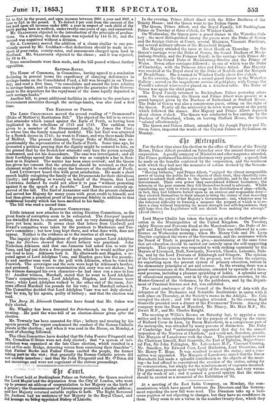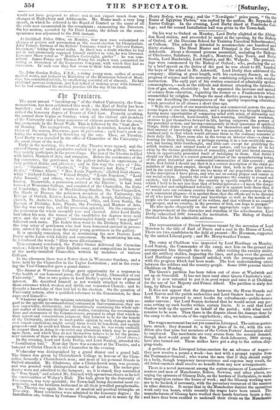brr 31Ittrnputit
For the first time since his election to the office of Master of the Trinity House, Prince Albert presided on Saturday over the annual dinner of the corporation. A goodly company of Ministers and other magnates attended. The Prince performed his duties as chairman very gracefully : a speech that he made on the benefits conferred by the corporation, and the readiness with which they had met the measures of reform devised by the Govern- ment, was much admired.
"Having hitherto," said Prince Albert, " enjoyed the almost irresponsible power of taxing the public for the objects of their trust, they cheerfully con- sented to submit their affairs to the utmost publicity, and to the control of Government. Their own power they surrendered without hesitation ; the interests of the poor seamen they felt themselves bound to advocate. Whilst repudiating any wish to retain patronage in the distribution of alma—which, in fact, they had hitherto looked upon as an anxious and responsible duty— they exerted themselves to their utmost to bring the claims of that deserving class under the notice of her Majesty's Government ; and, whatever may be the inherent difficulty in framing a measure the purport of which is to re- lieve a class without impairing its moral strength and self-dependence, they still hope that the Legislature will not shrink from making the attempt." (Loud cheers.) Lord Mayor Challis has taken the lead in an effort to further art-edu- cation in the Municipalities of the United Kingdom. On Tuesday, eighty Mayors and Provosts dined at the Mansionhouse ; the Duke of Ar- gyll and Earl Granville being also present. This was followed by a con- ference on Wednesday morning ; when Mr. Henry Cole and Dr. Lyon Playfair explained the views of the Government, and the assistance which the Board of Trade is prepared to give,—maintaining at the same time that art-education should be carried out entirely upon the self-supporting principle. This opinion was responded to with striking unanimity by the Mayors of Liverpool, Hull, Newcastle, Norwich, Chester, Leicester, Dub- lin, and by the Lord Provosts of Edinburgh and Glasgow. The opinion of the Conference was in favour of the proposal, now before the country, for engrafting upon the present system of primary education, tuition in the elementary principles of art and science. In the evening there was a grand conversazione at the Manaionhouse, attended by upwards of a thou- sand persons, including a pleasant sprinkling of ladies. A splendid array of educational apparatus, sent in by the great education societies, by the Master-General of the Ordnance, by the publishers, and by the Depart- ment of Practical Science and Art, was exhibited.
The usual conference of the Council of the Society of Arts with the delegates of the Mechanics and Scientific Institutions in union with it took place on Thursday, at the Society's rooms in the Adelphi. Mr. Cole occupied the chair ; and 160 delegates attended. In the evening Earl Granville presided over a dinner at the Freemasons' Tavern. Among the company were the Dean of Hereford, Mr. Blaney, Mr. Hutt M.P., Mr. Ewart M.P., and Mr. Charles Knight.
The meeting at Willis's Rooms on Saturday last, to appoint a com- mittee and to raise subscriptions for the purpose of setting up the statue of Richard Cmur de Lion, by Baron Marochetti, in a conspicuous part of the metropolis, was attended by many persons of distinction. The Duke of Cambridge had "unfortunately appointed that day for the annual inspection of the Marines at Chatham," and could not, therefore, preside. The Marquis of Lansdowne took the chair. The principal speakers were the Chairman himself, Earl Granville, the Earl of Eglinton, Major-Gene- ral Fos, Sir John Pakington, Mr. Labouchcre M.P., Viscount Canning, Mr. Smedley, Sir Edward Cust, Lord Hatherton, Lord Overstone, and Mr. Henry T. Hope. It was resolved to erect the statue; and a com- mittee was appointed. The Marquis of Lansdowne stated that the Baron Marochetti had made a splendid contribution to the objects of the meet- ing—he had offered to superintend the erection of the statue, asking for no remuneration, but simply for the reimbursement of expenses incurred. The gentlemen present spoke very highly of the sculptor, and very warm- ly of the work of art ; and it seemed a general opinion that the statue should be erected as a memorial of the Exhibition of '51.
At a meeting of the East India Company, on Monday the com- munications which have passed between the Directors and the Govern- ment regarding the new bill were read. The Directors take up a ludi- crous position of not objecting to changes, but they have no confidence in them. They seem to see a virtue in the number twenty-four, which they
would nut have proposed to alter : and do not expect much from the changes at Haileybury and Addiscombe. Mr. Hume made a very long speech, in which he referred to the Board of Control as the cause of all the evils now enumerated in the complaints ; exonerating the Directors. On his motion, seconded by Sir Peter Laurie, the debate on the corre- spondence was adjourned to the 20th instant.
At Guildhall Police Office, on Monday, four men were reexamined on charges of perjury and personation at the recent election for Chamberlain. John Palmer, freeman of the Salters' Company, voted as "Eduard Palmer, liveryman," taking the usual oaths. As there was a doubt whether he bad not in fact erroneously supposed himself entitled to vote, he was liberated. Lawrance Shaw voted as " Matthew Cartwright, girdler " : he was com- mitted. James Penny and Thomas Penny his nephew were committed for voting as liverymen of the Carpenters Company, with which they had no connexion. In each case they had sworn to their false statements.
Mr. John Gordon Bailey, F.R.S., a rising young man, author of several medical works, and lecturer on Midwifery at the Hunterian School of Medi- cine, has committed suicide, by swallowing essential oil of almonds. He had exhibited nervous irritation, and had talked of making away with himself ; but he had continued his medical practice till the day of his death.

























 Previous page
Previous page